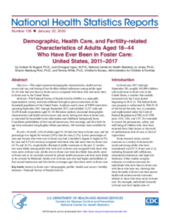Abstract
Objective—This report presents demographic characteristics, health service access and use, and timing of key fertility-related milestones among adults aged 18–44 who had ever been in foster care as compared with those who had never been in foster care in the United States.
Methods—The National Survey of Family Growth (NSFG) is a nationally representative survey, with data collected through in-person interviews of the household population of the United States. Analyses used 6 years of NSFG interviews spanning September 2011 through September 2017, and included 11,527 male and 14,439 female respondents aged 18–44. Bivariate analyses examined demographic characteristics and health service access and use by having ever been in foster care, as measured by household roster information and childhood background items. Cumulative probabilities of first sexual intercourse, first marriage, and first birth by age were estimated using Kaplan–Meier procedures. All estimates were stratified by sex.
Results—Overall, 2.6% of adults aged 18–44 had ever been in foster care, and the percentage was higher for women (3.0%) than for men (2.3%). Lower percentages of men and women who were ever in foster care had a bachelor’s degree or higher (4.8% for men and 9.1% for women) compared with those who had never been in foster care (31.1% and 36.2%, respectively). Receipt of public assistance in the past 12 months was more likely among adults who were ever in foster care compared with those who were never in foster care. Adults ever in foster care were less likely than adults never in foster care to be currently covered by private health insurance and were more likely to be covered by Medicaid. Adults ever in foster care also had higher probabilities of first sexual intercourse and first births at younger ages than those never in foster care.

